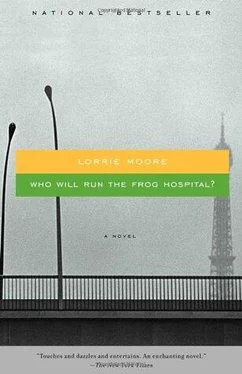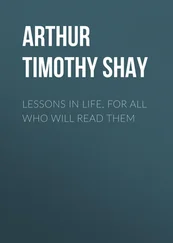We jumped into the motel pool, with our clothes on, laughing and practically drowning. We swam together to the shallow end, and when she stepped out of it, gleaming, her clothes wet and tight as leather, her hair streaming down her back, everyone looked. Though there was weariness in her walk, she was still slender and bold; I could see she was still some kind of sexual centerpiece here. All the Horsehearts boys who had stayed in town, become managers of stores or cinemas or the roller rink, still thought of her at night. In this neck of the woods, she was the neck of the woods.
We sat in lawn chairs, drying in the sun, and smoked quietly, with Randi, who seemed just the same as always except that, recovered from her Mary Kay days, she had changed her name to Travis, which she’d written on her name tag, with Randi in parentheses underneath. (Could one do that? Could one put one’s whole past, the fact of its boring turbulence, in parentheses like that?) We murmured about how bald all the boys were. “They look exactly like they did in high school,” said Sils, “except that now their hair’s gone and in their wallets instead of condoms they carry before-and-after photos of their home renovations. Welcome back to Horsehearts.” As she held her cigarette, and blew smoke away from me, I looked for the men from U.N.C.L.E . in her toenails but could not find them.
After the afternoon reception and buffet, we left, went to go drink in a new local restaurant, what Sils called “an-all-you-will-have-eaten place.” There was a long salad bar and a big open grill. One was supposed to cook one’s own steak. “Cook your own mistake,” she called it. I smiled in a way that I hoped wouldn’t seem distant. What did it mean that she had stayed here, in Horsehearts, in one place, like a tree? Though I knew one’s roots grew deep and steady that way, still, one’s lower limbs could fuse, or die, killed off by one’s own stalwart shade. “It’s the coleslaw here,” she said. “I just can’t get enough of it. Sometimes I think that, you know, watch: the slaw alone will keep me in this town forever.”
Later, she drove me around the village, to show me it again. The yards seemed emptier and larger than I remembered, the houses farther apart and glum, though pretty. A couple of times we got out and walked. There was no one on the street. The old sidewalks sparkled with quartz until we hit a part that had been repaired or replaced with newer clayey squares. When we drove by my old house, it seemed ungainly and obscene in its strangeness; in my mind the proportions of the house were warmer, different; in my mind it wasn’t this . It seemed alien. It seemed confiscated. “Let’s get out of here,” I said. The roads were country roads, still wooded and full of longing and despair and that search for something, anything going on; they were roads of rumor — curvy, restless roads that seemed for moments to stretch forward but then just turned back in on themselves, like snakes snacking on their own tails.
Back at her house, in the cool snap of the Adirondack night, Sils and I got into pajamas and collapsed sleepily on her water bed, which was heated and huge, a thing I might have found tasteless somewhere else but here was some perfection of calm and form, a dead man’s float on still water, while she spoke of getting a postal route in Hawaii.
“You can do that?” I asked.
“Sure.” She spoke some more of her life here, its trapped routines. Her mother had died. “She slaved away at that motel, and then she just died, without ever even a postcard from my dad.” Her brothers had moved to Texas and formed a band called the Jackhammer Hamsters. “Ever heard of them?”
“I’m not sure,” I said.
“They’re getting a little old ,” she whispered, and offered up a gentle wince.
She loved Hawaii. She’d been there once — with a guy named Mel — and had bought a big coffee-table book called Hawaiian Song in the airport. She got up from the bed to fetch it, spread it out on the billowing quilt, showed me some of the photographs: bright beaches and skies. Not an Adirondack in sight. “I’ve been on a postal transfer list for three years,” she said.
“It’s just a matter of time, then.”
“Probably.”
“Gee.” I sighed.
“Yeah.” She smiled in a bittersweet way.
I browsed through my mind, thinking about all the things I wanted to say, might say, could say. “Guess what?”
“What? I don’t know!”
“I’m engaged.”
“Get out of town! You are?” she exclaimed eagerly. “Where’s your ring!”
“We’re doing a cheap and easy minimalist thing: no rings, no wedding. Just — marriage.” I sighed.
“How Modern!”
“Yeah. Instead of saying ‘I do,’ we’re just going to say ‘Here.’ ”
“And what’s Mr. Here’s name?” “Daniel Hiawatha Bergman.”
“That’s his real name? Get out!”
“I swear to God.”
“Is he a good guy?”
A good guy. It sounded so Martha and the Vandellas. But it was Horsehearts. That was the way Horsehearts sounded. “Yeah. He’s a good guy.”
“Great, Berie, I’m so happy for you. You deserve a good guy.” Now she sighed. “And I always knew you’d get one. I always thought you’d end up with the best husband of all of us.”
“You did?”
“Of course. You had no idea. But of course.”
For a fleeting moment, as anyone can, I imagined I felt the poverty of my future, all its unholdable surfaces; I felt inexplicably ungrateful and sad. It was a moment of stillness in which one looks around and ruefully sees only the rocks and searing sun and cheap metal. “You wanted an adventure and instead you got Adventureland,” Sils herself used to say. I longed for a feeling again, a particular one: the one of approaching a room but of not yet having entered it. Being engaged to marry, it should have been what I felt. But instead I associated the feeling with another part of my life: that anteroom of girlhood, with its laughter as yet only affianced to the world, anticipation playing in the heart like an orchestra tuning and warming, the notes unwed and fabulous and crazed — I wanted it back! — those beginning sounds, so much more interesting than the piece itself.
Pièce —French for room, I remembered, the strangeness of night and this one upon me like a drug.
“You guys going to have kids?” asked Sils. She wriggled her way under the covers.
“Sure,” I said. “Why not?”
“That’s great,” she said. But something haggard suddenly entered her face. “That’s great.” She gave a yawn. “I suppose we should go to sleep.”
“It’s been a long day.”
“Good night, Berie,” she said, turning out the light. In the dark she added, “Congratulations! Thank you. I love you.” She paused. “Is there anything I missed?”
“Good luck,” I said. “Drive safely. Wipe your feet. Happy Birthday and Have a Nice Life. There’s a lot you forgot.”
“Many happy returns,” she said sleepily. “And Good Fate. That’s the real one.” She turned with the sheet clutched to her breastbone, the water beneath us rolling gently. I lay in the dark next to her, feeling like a creature that had entered through a damp cranny or a bad shingle in the roof: a bat that could swoop silently about in her house. Why not? Bats, I knew, were sentimental. They returned to where they once lived, even when shut out; they sought their own smell. I couldn’t sleep. I was lying on top of the covers, which made it easy to get up. I rolled out of bed, stepped ashore, out into her house, and roamed through the rooms, touching things. I couldn’t really see what they were, but I could feel them: a needlepoint pillow, a pile of newsprint shoppers, little ceramic statues of cats — discovering these cats, I felt less shocked than puzzled and disappointed — a large, foil-wrapped chocolate egg, a basket of hair ties and barrettes.
Читать дальше












